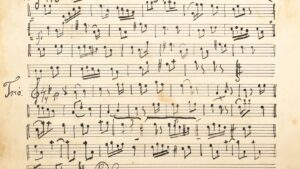In the world of music, there’s a phenomenon that’s as intriguing as it is perplexing – the false hype surrounding sheet music. It’s a topic that’s often swept under the rug, but deserves a spotlight for its impact on musicians and enthusiasts alike.
False Hype Sheet Music
 False hype sheet music refers to the artificially inflated popularity or perceived value of certain pieces or scores. It’s a product of savvy marketing tactics and persuasive strategies. For instance, a musical score might be touted as being ‘the next big thing,’ thereby sparking heightened interest and demand. It’s important to note that this doesn’t necessarily reflect the quality or artistic merit of the music itself. Professionals, ranging from concert pianists to orchestra directors, can fall victim to this mix of marketing and psychology, potentially investing in music that may not live up to the hype. Moreover, popularity-driven bias can distort the appreciation of less hyped music that could be highly valuable to the performer, listener, or both. Thus, understanding the concept of false hype in the context of sheet music can help one approach the selection and interpretation of music more objectively.
False hype sheet music refers to the artificially inflated popularity or perceived value of certain pieces or scores. It’s a product of savvy marketing tactics and persuasive strategies. For instance, a musical score might be touted as being ‘the next big thing,’ thereby sparking heightened interest and demand. It’s important to note that this doesn’t necessarily reflect the quality or artistic merit of the music itself. Professionals, ranging from concert pianists to orchestra directors, can fall victim to this mix of marketing and psychology, potentially investing in music that may not live up to the hype. Moreover, popularity-driven bias can distort the appreciation of less hyped music that could be highly valuable to the performer, listener, or both. Thus, understanding the concept of false hype in the context of sheet music can help one approach the selection and interpretation of music more objectively.
The Production and Distribution of False Hype Sheet Music
The manufacturing journey of false hype sheet music is intriguing. It starts with its creation being influenced by various factors. Predominantly, the target audience’s taste shapes its production. Producers, capitalizing on popular trends, push out music sheets brimming with hype. It’s a strategic move targeting sales increase, knowing the attraction of a trending genre’s sheet music to musicians.
 Next comes the distribution process. In the digital age, social media platforms and online music stores play a significant role. Aimed at a broader audience reach, they strategically display popular or trending music sheets. Ad placements, premium listings, and sponsored recommendations help propagate the false hype, leading musicians to these inflated sheets.
Next comes the distribution process. In the digital age, social media platforms and online music stores play a significant role. Aimed at a broader audience reach, they strategically display popular or trending music sheets. Ad placements, premium listings, and sponsored recommendations help propagate the false hype, leading musicians to these inflated sheets.
Among others, fabricated reviews further fuel the hype fire. While musicians may believe they’re purchasing a top-rated piece, they’re often misled by growers’ strategic tactics. This artificial inflatability distorts the real value, creating a bias that marginalizes genuinely worthy pieces. Correspondingly, it’s not the music sheet’s quality, but its promotional and strategic marketing that influences musicians’ purchases.
Overall, it’s a calculated process of production and distribution with a single end-goal: sales boost. With this insightful exposure, musicians can now approach their sheet music selections with a more discerning perspective.
Impact of False Hype Sheet Music on the Industry
False hype sheet music continues to shake the music industry, producing various effects. It manipulates market trends, first by influencing the quantity and quality of sheet music produced. For instance, with a focus on popular genres, creators tend to sacrifice quality for quantity, affecting overall production standards.
 On the economic front, false hype influences pricing. Sheets backed by false hype often come with hefty price tags, placing undue financial strain on professionals. This could lead to dwindling investments in sheet music as musicians seek better value.
On the economic front, false hype influences pricing. Sheets backed by false hype often come with hefty price tags, placing undue financial strain on professionals. This could lead to dwindling investments in sheet music as musicians seek better value.
In terms of perception, it distorts the worth of under-hyped compositions. This undue prejudice could limit musicians’ repertoire, and curtail their ability to discover potentially enriching compositions.
How to Discern True Quality from False Hype
The false hype surrounding sheet music is a complex issue that’s reshaping the music industry. This phenomenon is not just about the inflated popularity of certain pieces. It’s about the manipulation of market trends, the distortion of music appreciation, and the financial strain on musicians. The key to navigating this landscape lies in discerning the true quality of music from the false hype.
Musicians are encouraged to develop a critical eye when selecting their sheet music. Don’t be swayed by savvy marketing tactics or fabricated reviews. Instead, focus on the intrinsic value of the music, not its perceived popularity. Remember, it’s the quality of the music sheet that should drive your selection, not the promotional strategies employed.

